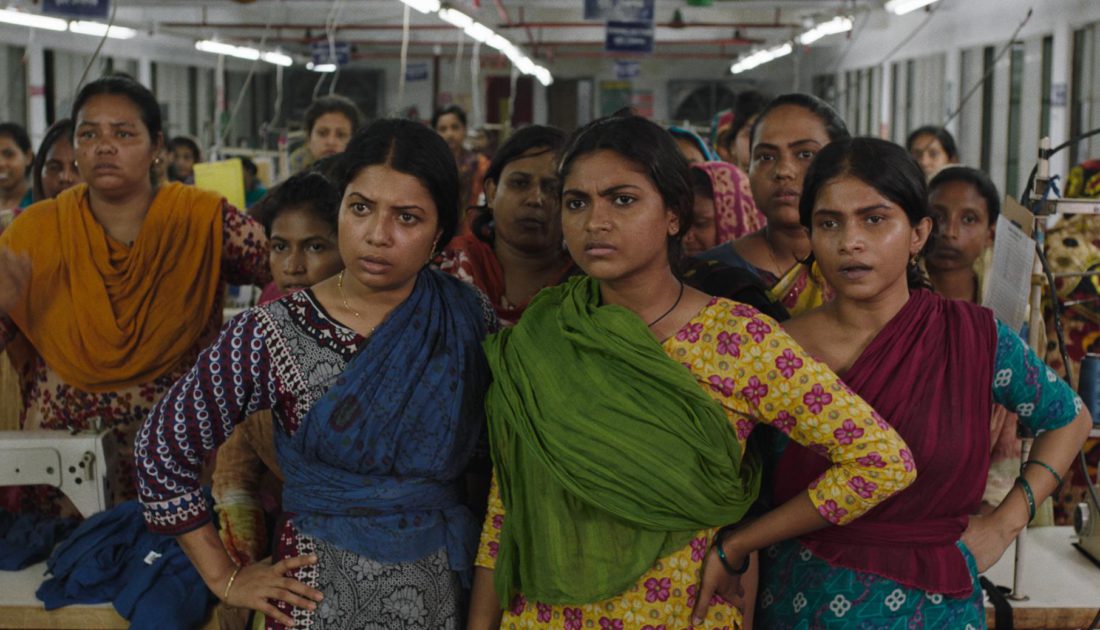A thoroughly dissatisfying experience, Made in Bangladesh is filled with immense promise but misses the mark so completely that it might as well not have been made at all.
Writer/director Rubaiyat Hossain’s drama begins with the buzzing of ceaseless sewing machines, followed by a wailing fire alarm and plumes of thick smoke. With a panic-stricken workforce frantically attempting to exit the burning building, the blood, sweat and very real tears that go into that $7.99 H&M shirt we all love so much are put on full display. In the aftermath of this garment factory fire, we’re introduced to Shimu (Rikita Nandini Shimu), a 23-year-old laborer who tirelessly toils away with her fellow all-female workforce, sewing up to 1,500 shirts a day in a brutally unsafe Bengali sweatshop.
With a husband out of work and no immediate family nearby, Shimu is forced to work in hazardous conditions for meager wages just to survive. Her colleagues are all similarly struggling, but she seems to be on the verge of a break. After learning that her co-worker and friend died in the fire, Shimu is approached by a journalist and human rights activist who encourages her to create a labor union. The catch is, she must do so in secret and with the help of her hesitant colleagues, as the consequences for unionizing are swift, severe and even dangerous. Still, Shimu embarks on a quest for justice for her friend, herself and all the Bengali women who are just like her.
Made in Bangladesh makes it clear that in this society, there are drastic downsides to being a woman of any status: Marriage provides social and financial security, but wives are often expected to be modest, and many are encouraged not to work or be independent of their husbands. In contrast, being single provides significant social freedoms but heavy financial instability and harsh societal judgments. This systemic inequity is perhaps the most interesting facet of the film, and during the scenes in which it’s referenced, I found myself surprisingly engaged.
However, Hossain glosses over the specifics of this hardship far too quickly to garner any genuine empathy from viewers. The largely cursory exploration of Shimu’s battle feels like an overly simplified blueprint of how to fight the powers that be and little else. There’s a clear connection to the feminist fight of Norma Rae in both content and aspiration, but Made in Bangladesh never feels nuanced or inspirational enough to fully connect with its predecessor. The story has massive potential to unpack the pervasive inhumane practices currently facing global factory workers, though this attempt seems to merely skim the surface.
Adding to this disconnect is a noticeable absence of distinctive directorial style, and it’s this failure to execute that serves as the film’s biggest offense. Hossain’s amateurish direction lacks confidence and guidance and is quite frustrating to watch. The pace tends to meander as well — big, melodramatic moments are followed by overly drawn-out lulls — and the “stick it to the man” speeches come off as too contrived to feel fully cathartic.
Compounding these grievances is the character development — or lack thereof. Not only does the rudimentary filmmaking make it difficult to get behind Shimu’s cause, but the charisma of the actor playing her has a hard time translating to the screen. Instead of creating a charming or complicated character worth rallying behind, Shimu’s outrage tends to read as artificial and inauthentic — a real shame given the importance of her plight.
Respectively, the narrative never dives deeply into the lives of any one character, Shimu included, and instead shies away from establishing any sort of complex backstory. A deeper exploration of Shimu’s life before her mission — including the casually mentioned fact that she was almost married off to a 40-year-old man at age 14 and ran away from home as a result — would have provided the necessary context for her struggle and the film’s underlying ethos alike. Rather, we see her dealing with various abuses largely at a surface level, underscored by a few winceworthy moments of hysterical wailing and exaggerated overacting.
It’s not all on the actress’s shoulders, however, given that the transparent direction does much to deflate her character’s arc. Unfortunately, both parties work in tandem to disconnect viewers from the full weight of the film’s worthwhile mission. This story is important and merits telling — as the detrimental effects of the fast fashion industry are continually ravaging the workforce of developing countries today — but the overly theatrical approach and weak performances overshadow its significance.
Considering its myriad failures, this film probably should have been a gritty documentary exposing the horrors these factory workers constantly endure, or perhaps a more nuanced portrait of a brave, one-woman mission. Instead, the story lies somewhere in between, existing as a detached portrayal of a woman clumsily navigating an oppressive and unfair societal structure. Made in Bangladesh is undoubtedly earnest and heartfelt in its intentions, but its execution is far too simplistic to be effective or entertaining, and unfortunately, it falters much more than it flourishes.
Available to rent starting Aug. 28 via grailmoviehouse.com



Before you comment
The comments section is here to provide a platform for civil dialogue on the issues we face together as a local community. Xpress is committed to offering this platform for all voices, but when the tone of the discussion gets nasty or strays off topic, we believe many people choose not to participate. Xpress editors are determined to moderate comments to ensure a constructive interchange is maintained. All comments judged not to be in keeping with the spirit of civil discourse will be removed and repeat violators will be banned. See here for our terms of service. Thank you for being part of this effort to promote respectful discussion.